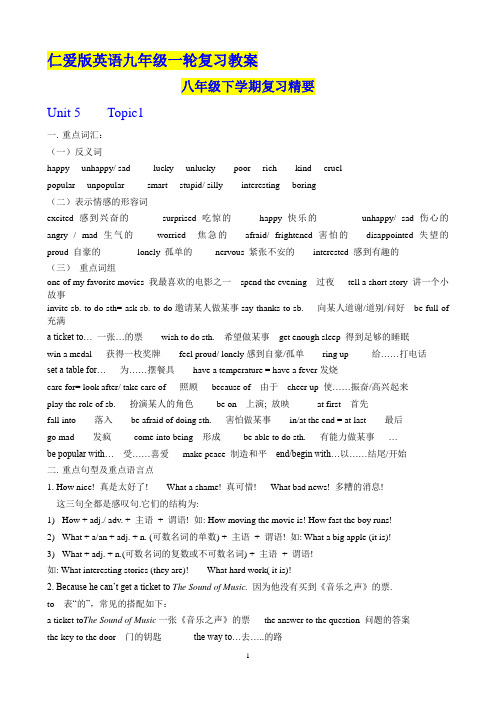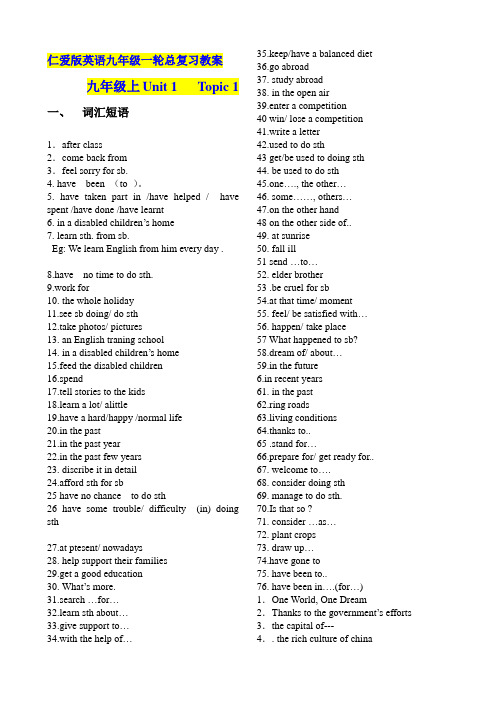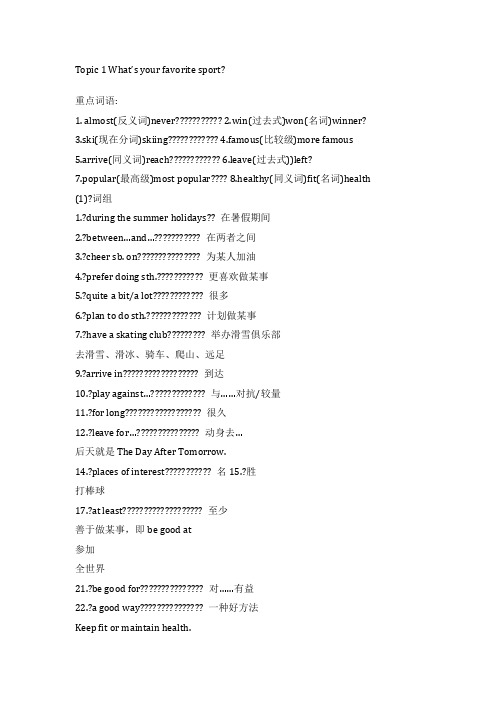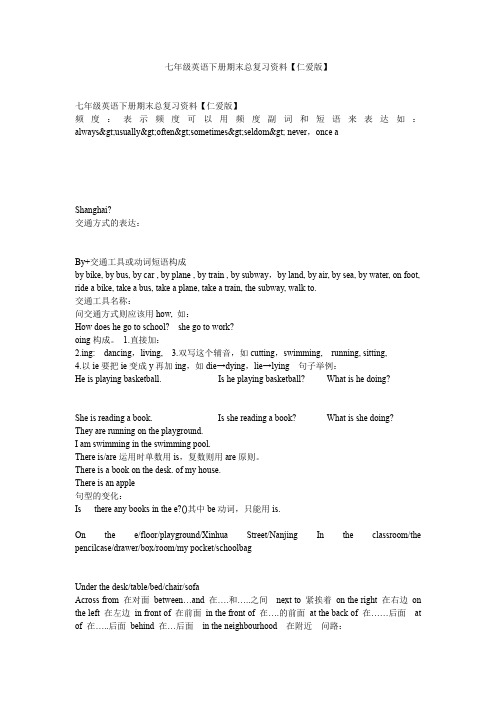(完整版)初中英语总复习材料(仁爱版)
完整word版初中英语总复习材料仁爱版

初中英语总复习材料(仁爱版)七年级(上)Unit 1 复习要点短语和句子1、Good morning/ Good afternoon / evening .早上/下午/晚上好2、(It's) Nice to meet/see you. = (It's)Good to meet/see you.= (I'm) Glad to meet/see you= (I'm) Pleased to meet/see you= (I'm) Happy to meet/see you.很高兴见到你3、Welcome to China 欢迎到中国来.4、Thanks /Thank you . 谢谢5、You're welcome ./ That's all right (OK) .不用谢,6、Stand up . 起立Sit down .坐下7、This is…..介绍第三者的用语,复数用These are…8、How do you do ? 您好9、How are you? 您好吗?How is she\he? 她\他好吗?10、I'm fine . 我很好。
11、What's your/his /her name ?= May I know/have your/his /her name?Could you please tell me your/his /her name?你/他/她叫什么名字?12、My name is Jane . 我名叫简13、Where are you from ? = Where do you come from? Where is he/she from?= Where does he/she come from?你/他/她/他们来自哪里?14、I am / He (She) is /They are from Canada/Japan/the U.S.A/England/Cuba/China.我/他/她/他们来自加拿大/日本/美国/英国/古巴/中国。
仁爱英语九年级第一轮总复习材料(八下)

仁爱版英语九年级一轮复习教案八年级下学期复习精要Unit 5 Topic1一.重点词汇:(一)反义词happy----unhappy/ sad lucky----unlucky poor----rich kind----cruelpopular----unpopular smart----stupid/ silly interesting----boring(二)表示情感的形容词excited感到兴奋的surprised 吃惊的happy 快乐的unhappy/ sad 伤心的angry / mad 生气的worried 焦急的afraid/ frightened 害怕的disappointed 失望的proud 自豪的lonely 孤单的nervous 紧张不安的interested 感到有趣的(三)重点词组one of my favorite movies 我最喜欢的电影之一spend the evening 过夜tell a short story 讲一个小故事invite sb. to do sth= ask sb. to do邀请某人做某事say thanks to sb. 向某人道谢/道别/问好be full of 充满a ticket to… 一张…的票wish to do sth. 希望做某事get enough sleep 得到足够的睡眠win a medal 获得一枚奖牌feel proud/ lonely感到自豪/孤单ring up 给……打电话set a table for… 为……摆餐具have a temperature = have a fever发烧care for= look after/ take care of 照顾because of 由于cheer up 使……振奋/高兴起来play the role of sb. 扮演某人的角色be on 上演; 放映at first 首先fall into 落入be afraid of doing sth. 害怕做某事in/at the end = at last 最后go mad 发疯come into being 形成be able to do sth. 有能力做某事…be popular with… 受……喜爱make peace 制造和平end/begin with…以……结尾/开始二.重点句型及重点语言点1. How nice! 真是太好了! What a shame! 真可惜! What bad news! 多糟的消息!这三句全都是感叹句.它们的结构为:1)How + adj./ adv. + 主语+ 谓语! 如: How moving the movie is! How fast the boy runs!2)What + a/an + adj. + n. (可数名词的单数) + 主语+ 谓语! 如: What a big apple (it is)!3)What + adj. + n.(可数名词的复数或不可数名词) + 主语+ 谓语!如: What interesting stories (they are)! What hard work( it is)!2. Because he can’t get a ticket to The Sound of Music. 因为他没有买到《音乐之声》的票.to 表“的”,常见的搭配如下:a ticket to The Sound of Music一张《音乐之声》的票the answer to the question 问题的答案the key to the door 门的钥匙the way to…去…..的路3. I think Mr. Lee likes it very much and really wishes to watch it. 我认为李老师非常喜欢它而且的确想去看. wish/ hope to do sth.希望做某事,与wish 相关的结构还有: wish/ hope + that引导的从句; 如:I wish/ hope (that) we will win.我们可以说wish sb. to do sth. 而不能说hope sb. to do sth.;4. I’ll ring up Michael later. 稍后我打电话给迈克. 当宾语为代词时, 只能放中间.如: ring me/him/her upring up sb. = call/ ring/ phone sb. = give sb. a ring/ call/ telephone = make a telephone to sb.5. Michael isn't able to come.can与be able to 二者都表“能;会”,在指“一般能力”时,常互换。
仁爱英语九年级第一轮总复习材料(九上unit1)

仁爱版英语九年级一轮总复习教案九年级上Unit 1 Topic 1 一、词汇短语1.after class2.come back from3.feel sorry for sb.4. have been (to )。
5. have taken part in /have helped / have spent /have done /have learnt6. in a disabled children’s home7. learn sth. from sb.Eg: We learn English from him every day .8.have no time to do sth.9.work for10. the whole holiday11.see sb doing/ do sth12.take photos/ pictures13. an English traning school14. in a disabled children’s home15.feed the disabled children16.spend17.tell stories to the kids18.learn a lot/ alittle19.have a hard/happy /normal life20.in the past21.in the past year22.in the past few years23. discribe it in detail24.afford sth for sb25 have no chance to do sth26 have some trouble/ difficulty (in) doing sth27.at ptesent/ nowadays28. help support their families29.get a good education30. What’s more.31.search …for…32.learn sth about…33.give support to…34.with the help of…35.keep/have a balanced diet36.go abroad37. study abroad38. in the open air39.enter a competition40 win/ lose a competition41.write a lettered to do sth43 get/be used to doing sth44. be used to do sth45.one…., the other…46. some……, others…47.on the other hand48 on the other side of..49. at sunrise50. fall ill51 send …to…52. elder brother53 .be cruel for sb54.at that time/ moment55. feel/ be satisfied with…56. happen/ take place57 What happened to sb?58.dream of/ about…59.in the future6.in recent years61. in the past62.ring roads63.living conditions64.thanks to..65 .stand for…66.prepare for/ get ready for..67. welcome to….68. consider doing sth69. manage to do sth.70.Is that so ?71. consider …as…72. plant crops73. draw up…74.have gone to75. have been to..76. have been in….(for…)1.One World, One Dream 2.Thanks to the government’s efforts 3.the capital of---4.. the rich culture of china5.as well6.with the help of =with one’s help.7.divide my money into two parts.8. at that time/on that day9. --enough--- to do sth.10.made such rapid progress11. write an article about12.the Chinese teenagers’ lives二、重点句子1.Did you have a good summer holiday?2.How was your trip?3.In one place I saw children working for acruel boss.4.I felt sorry for them.5.A: Where have you been, Jane?B: I have been to Mount Huang with my parents.6.A: Where has he/she / kangkang been?B: He has been to an English training school to improve his English.7.There goes the bell。
2021年仁爱版初中英语七年级上册期末考复习资料汇总

2021年仁爱版初中英语七年级上册期末考复习资料汇总1.冠词a an thean orange an egg an apple an hour an English an American boy an erasera book a ruler the book the books2. 疑问词What 什么 what color 什么颜色 who 谁 whose 谁的Where 哪里 How 怎样 why 为什么 when 什么时候3. 人称代词主格宾格形性+名词名性主格宾格形性+名词名性I me my mine We us our oursyou you your yours you you your yourshe him his hisshe her her hers they them their theirsit it its itsone 指同类不同个 Liming has a book and I have one,too.it 上面出现的同一个 Liming has a book. It is red.4. 表达喜欢和不喜欢I like ---- 我喜欢---- I like----- a little 我有点喜欢----I like-----a lot 我非常喜欢--- I like -----very much 我非常喜欢--- He likes ---- 我喜欢---- He likes ----- a little 我有点喜欢----He likes -----a lot 他非常喜欢--- He likes -----very much 他非常喜欢---I don't like ---- 我不喜欢---- I don't like ----at all 我根本不喜欢----He doesn't like ---- 他不喜欢---- He doesn't like ----at all 他根本不喜欢----5.Be 动词 am is areI am a student.Li Ming is a student. He is a cook.Li Ming and I are students. These are English books.They are students。
(完整版)仁爱版英语八年级上知识点归纳

Topic 1 What’s your favorite sport?重点词语:1. almost(反义词)never2.win(过去式)won(名词)winner?3.ski(现在分词)skiing4.famous(比较级)more famous5.arrive(同义词)reach6.leave(过去式))left?7.popular(最高级)most popular 8.healthy(同义词)fit(名词)health (1)?词组1.?during the summer holidays?? 在暑假期间2.?between…and… 在两者之间3.?cheer sb. on 为某人加油4.?prefer doing sth. 更喜欢做某事5.?quite a bit/a lot 很多6.?plan to do sth. 计划做某事7.?have a skating club 举办滑雪俱乐部去滑雪、滑冰、骑车、爬山、远足9.?arrive in 到达10.?play against… 与……对抗/较量11.?for long 很久12.?leave for… 动身去…后天就是The Day After Tomorrow.14.?places of interest 名15.?胜打棒球17.?at least 至少善于做某事,即be good at参加全世界21.?be good for 对……有益22.?a good way 一种好方法Keep fit or maintain health.24.?relax oneself 放松某人自己重点句型你最喜爱的运动是什么?26.?Which sport do you prefer? = Which sport do you like better? 你更喜欢什么运动?I prefer skating. = I like skating better. 我更喜欢滑雪.你常滑雪吗?或Do you often skate?28.?She spends at least half an hour in the gym every day. 每天她至少花半小时在体育馆.29.?She plays baseball pretty well and she is also good at jumping.她棒球打得相当好而且擅长于跳.30.?What kind of sports do you like? = Which sport do you like? 你喜欢哪种运动? 重点语言点31.?see sb. do sth? “看见某人做了某事” 强调动作的全过程,常与every day; often 等连用.see sb. doing sth.? “看见某人正在做某事” 强调动作正在进行.I saw you play basketball almost every day during summer holidays.I often see him draw pictures near the river. 我常看见她在河边画画.I saw her go across the street.? 我看见她过了马路我看见她正在过马路。
七年级英语下册期末总复习资料【仁爱版】

七年级英语下册期末总复习资料【仁爱版】七年级英语下册期末总复习资料【仁爱版】频度:表示频度可以用频度副词和短语来表达如:always>usually>often>sometimes>seldom> never,once aShanghai?交通方式的表达:By+交通工具或动词短语构成by bike, by bus, by car , by plane , by train , by subway,by land, by air, by sea, by water, on foot, ride a bike, take a bus, take a plane, take a train, the subway, walk to.交通工具名称:问交通方式则应该用how, 如:How does he go to school? she go to work?oing构成。
1.直接加:2.ing: dancing,living,3.双写这个辅音,如cutting,swimming, running, sitting,4.以ie要把ie变成y再加ing,如die→dying,lie→lying 句子举例:He is playing basketball. Is he playing basketball? What is he doing?She is reading a book. Is she reading a book? What is she doing?They are running on the playground.I am swimming in the swimming pool.There is/are运用时单数用is,复数则用are原则。
There is a book on the desk. of my house.There is an apple句型的变化:Is there any books in the e?()其中be动词,只能用is.On the e/floor/playground/Xinhua Street/Nanjing In the classroom/the pencilcase/drawer/box/room/my pocket/schoolbagUnder the desk/table/bed/chair/sofaAcross from 在对面between…and 在….和…..之间next to 紧挨着on the right 在右边on the left 在左边in front of 在前面in the front of 在….的前面at the back of 在……后面at of 在…..后面behind 在…后面in the neighbourhood 在附近问路:Is there a post office near here?Where is the post office ,please ?How can I get to post office?指路:It’s over there .to the end.时间表达:几点:介词at+点钟(几点的表达有两种,顺读和逆读,逆读有两种情况,一用past,小于或等于30分时,二用to,大于30分时,此时整点部分应该加1)如:at six at twelve at ten past eight at a quarter past eighthalf past eight fifteen to eleven 注:顺读:10:40 ten forty哪天:用介词on+星期或日期(日期的表达,英式是:the+序数词的日+of+月份,美式是:月份+the+序数词的日)如:on Monday on Friday on April the tenth on the ninth of April序数词:first第一second第二third第三fifth eighth第八ninth第九twelfth第十二twentieth第二十twenty-first第二十一twenty-second 第二十二twenty-third哪年、哪月、哪个季节:介词用in 读)In 1996——in nineteen ninety-six谈论能力:使用情态动词can do sth. Sb can’t do sthCan sb do sth?动词过去式变1. watched looked2. lived loved liked danced3.y为i ,ed worried carried5. A—A A—B 型was are——were have/has——had go——went did+动词的过去式+其它。
初中英语(仁爱版)总复习提纲

07届初中英语(仁爱版)总复习提纲Book7A(Unit1)一、按要求写出下列单词的相应形式。
1. bus(复数形式) __________2. he(复数形式) __________3. I am(缩写形式)4. these(对应词) ___________5. what is(缩写形式) _________6.apples(单数形式) _________7. yes (反义词)___________8.中学(汉译英) _____________9. 用英语(汉译英)___________ 10. 七年级四班(汉译英) ________二、根据句意及所给首字母或汉语意思,完成句子。
1.Jane is English. She is from E___________.2.Have a n__________ day !3.This is my English t____________, Mr. Lee.4.Is Deng Yaping f____________ China ?5.What’s your t______________ number ?6.They are not in the s____________ class.7.These are Chinese ____________ (公共汽车).8.They are in Class ____________(十二),Grade One.9.Where is _________ (小芳的) toy ?三、选择填空。
( )⒈―Are you Wang Hui?‖―____ I’m Yang Haifeng.‖A. Yes, I am.B. No, I’m not.C. Hi!D. This is Wang Hui. ( )⒉―Sit down, please. ‖― _ ‖A. Thanks.B. You sit down.C. Yes, please.D. OK! ( )⒊―Hello, Mr Qiu!‖―_ ‖A. You, too.B. Hello, class!C. Thanks.D. OK! ( )⒋. ―_ ‖―J-A-N-E, Jane.‖A. What’s your name?B. Are you Jane?C. Who are you?D. How do you spell your name? ( )5.This is Miss Wu. _____ is my friend.A. HeB. HerC. HisD. She( )6.—_____is your brother (弟弟)?—He is six.A. HowB. WhatC. WhoD. How old ( )7.You ____ten and I ____nine.A. is; amB. are; amC. is; areD. are; is ( )8.That’s girl is my friend. _____name is Kumiko.A. MyB. HisC. HerD. Your( )9.My family is in Nanjing. I’m from____.A. JiangsuB. AnhuiC. JiangxiD.Hubei ( )10.—What’s this? —________.A.Yes, it’s a pearB. No, it isn’t an eggC. It’s an orangeD. It’s English car( )11.---Is this your book? —________.A. Yes, this isB. Yes, it isC. Yes, she isD. Yes, they are ( )12.---Welcome to China! --- ________.A. Thank youB. That’s all rightC. See youD. Good morning ( )13.—What’s this ______ English ? --- It’s a pen.A. fromB. toC. inD. at( )14.—That’s _____car. It’s _____ English car.A. a, anB. a, aC. an, aD. an, an ( )15.. --________are they from? --They are from England.A. WhatB. WhereC. WhoD.How( )16. --_______ you Kitty? --Yes, I _____ .A. Am; areB. Is; amC. Are; amD.Am; am ( )17 --Who is that? --________.A. That is NancyB. This is NancyC. I'm NancyD.She is Nancy ( )18.. --- _______ is he? --He is 14.A. WhereB. HowC. How oldD.What( )19. --_____ do you spell it ? -- O-R-A-N-G-E ,orange .A. WhereB. HowC. WhatD.Who( ) 20. --What are those in English ? -- ____.A.Those are busB. They are bussC.They are boxesD.These are boxes( )21. – Is this ____ bike? -- No, it isn’t. It’s ___bike .A. you, hisB. his, herC. your, sheD.her, he ( ) 22. --This is ____ orange and that is ____ box.A. a, aB. an, anC. an, aD.a, an( ) 23. --What class are you in? --I'm in _________A. Class Three, Grade SevenB. Class one, Grade sevenC. Grade 6, Class 3,D.Grade seven, Class Seven( ) 24 --Jane and Maria are not in same class .A theB aC an D./( ) 25.—Thank you. -- .A.No, no thanks.B. Don’t thank me.C. Oh, yes.D. That’s Ok四、补全对话⒈A:________ she Shi Hongmei?B:No, she __________ . ________ Luo Hongfang.⒉A:______ you in Class Four, Grade One?B:_______ , I ________ .A:Good! We are in the same class.⒊A:Are Tom and Sam from the United States?B:_____ , they ________ .A:________ are they from?B:__________ from Canada.五、句型转换,每空一词。
初中英语总复习材料仁爱版.doc

初中英语总复习材料(仁爱版)七年级(上) Unit 1复习要点短语和句子1、Good morning/ Good afternoon / evening .早上 /下午 /晚上好2、(It’ s) Nice to meet/see you. = (It’ s)Good to meet/see you.= (I’ m) Glad to meet/see you= (I’ m) Pleased to meet/see you= (I’ m) Happy to meet/see you.很高兴见到你3、Welcome to China欢迎到中国来.4、Thanks /Thank you . 谢谢5、You’ re welcome ./ That’ s all right不(OK)用谢,.6、Stand up . 起立 Sit down . 坐下7、This is⋯介..绍第三者的用语,复数用These are ⋯8、How do you do ?您好9、 How are you? 您好吗?How is she\he? 她他好吗?10、 I ’ m fine 我.很好。
11、What’ s your/his /her name ?= May I know/have your/his /her name?Could you please tell me your/his /her name?你 /他 /她叫什么名字?12、 My name is Jane . 我名叫简13、 Where are you from ? = Where do you come from? Where is he/she from?= Where does he/she come from?你 /他/她/他们来自哪里?14、 I am / He (She) is /They are from Canada/Japan/the U.S.A/England/Cuba/China.我 /他/她/他们来自加拿大 /日本 /美国 /英国 /古巴 /中国。
- 1、下载文档前请自行甄别文档内容的完整性,平台不提供额外的编辑、内容补充、找答案等附加服务。
- 2、"仅部分预览"的文档,不可在线预览部分如存在完整性等问题,可反馈申请退款(可完整预览的文档不适用该条件!)。
- 3、如文档侵犯您的权益,请联系客服反馈,我们会尽快为您处理(人工客服工作时间:9:00-18:30)。
初中英语总复习材料(仁爱版)七年级(上)Unit 1 复习要点短语和句子1、Good morning/ Good afternoon / evening .早上/下午/晚上好2、(It’s) Nice to meet/see you. = (It’s)Good to meet/see you.= (I’m) Glad to meet/see you= (I’m) Pleased to meet/see you= (I’m) Happy to meet/see you.很高兴见到你3、Welcome to China 欢迎到中国来.4、Thanks /Thank you . 谢谢5、You’re welcome ./ That’s all right (OK) .不用谢,6、Stand up . 起立Sit down .坐下7、This is…..介绍第三者的用语,复数用These are…8、How do you do ? 您好9、How are you? 您好吗?How is she\he? 她\他好吗?10、I’m fine . 我很好。
11、What’s your/his /her name ?= May I know/have your/his /her name?Could you please tell me your/his /her name?你/他/她叫什么名字?12、My name is Jane . 我名叫简13、Where are you from ? = Where do you come from? Where is he/she from?= Where does he/she come from?你/他/她/他们来自哪里?14、I am / He (She) is /They are from Canada/Japan/the U.S.A/England/Cuba/China.我/他/她/他们来自加拿大/日本/美国/英国/古巴/中国。
15、Cheers .干杯16、How old are you ? 你几岁了?17、I’m five (years old) 我五岁了18、What’s your phone number ?你的电话号码是多少?My telephone number is……= It’s…..19、What class /grade are you / is he /she in ?你/他/她在哪个班级/年级?20、I am / He /She is in Class Four , Grade One .我/他/她在一年级四班。
21、Who is that ? 那是谁?22、That’s Lucy 那是露西。
.23、What’s this / that in English ? It’s …… 这/那用英语怎么表达?24、This / That is an orange 这/那是一个桔子。
.25、What are these / those ? 这/那些是什么?26、They are schoolbags / books /buses .它们是书包/ 书/公共汽车。
27、Is this /that a telephone ? 这/那是一部电话吗?28、Yes, it is.\ No, it isn’t.29、Are these /those pencils ?这些是铅笔吗?30、Yes, they are.\No, they aren’t.31、How do you spell it你是怎么拼写它的?M—A—P, map.32、Can you spell it? Yes, M—A—P, map.33、Excuse me . 请问,打扰了34、in the same class 在相同的班级35、good friend 好朋友36、.Mr. Mrs Miss Ms用于姓之前(Mr. 表示先生,是对中年男子的尊称,婚否不限;Mrs表示夫人,是对中年已婚女子的称呼:Ms,是对不知婚否女子的称呼;Miss是对未婚女子或老师的称呼)语法1、be中am、is、are的基本用法,区别及其引导的一般疑问句和回答.am接在I之后,is放在单数的名词或代词之后,are放在复数的名词或代词之后,否定句在be后加not,一般疑问句将be提前。
回答:Yes,人称代词+ be./ No, 人称代词+be + not.He is Mr. Chen. He is not Mr. Chen. Is he Mr. Chen?Yes, he is. / No, he is not.I am a student. I am not a student. Are you a student?Yes, I am. / No, I am not.They are teachers. They are not teachers. Are they teachers?Yes, they are. / No, they are not.2.名词的复数:1)一般在名词词尾加—s car---cars; apple--apples2)以s,x,ch,sh结尾的词,在词尾加---es,如:box---boxes; bus---buses; watch ---watches.3)部分国人的复数:以an结尾的单词,在词尾加—s;以结尾的单词,单复数同形。
如:Chinese---Chinese, Japanese---Japanese, American---Americans Brazilian—Brazilians, Canadian---Canadians.3)以辅音字母+y结尾,变y为i再加es,如:family---families.5)以fe、f结尾,变fe、f为ve再加s,如:life---lives.6)特殊情况,如:mouse---mice;foot---feet,tooth--teeth, Chinese--Chinese, Japanese--Japanese3. 基数词的表达:0—100 zero one two three four five six seven eight nine ten eleven twelve thirteen fourteen fifteen sixteen seventeen nineteen twenty twenty-one thirty…forty… fifty…sixty…4. a,an,the的用法: a /an 都表示“一,一个”,如果单词的音标是元音音标开始的,我们在前用an, an apple / a ‘u’;/ an ‘s’Unit 2 Looking DifferentTopic 1small - big / large / wide long - short black – white tall - shortyoung – old new - old1. a small nose 一个小鼻子2. a big head 一个大头3. long\short hair 长/短头发4. a wide mouth 一个大嘴巴5. round faces 圆脸6. your favorite movie star 你最喜爱的电影明星7. guess again 再猜8. a good student 一个好学生9. have a sister 有一个姐妹10. her/his name 他/她的名字11. in the same school 在同一所学校12. in different grades 在不同的年级13. Your face is long . = 14. His hair is short. =15. Do you have long hair? Yes, I do. No, I don’t. Yes, we do. No, we don’t.16. Does she / he have big eyes? Yes, she / he does. No, she / he doesn’t.17. Do they have new friends?Yes, they do. No, they don’t.10. I know. 我知道 I don’t know. 我不知道。
I see.我明白11. I’m thirteen years old. = I’m 13 years old.= I’m 13. = I’m thirteen.Topic21. What does she look like? 她看起来怎么样?2. that boy 那个男孩3. my friend 我的朋友4.look the same=have the same looks 看起来一样5. look different =have different looks 看起来不一样6. blond hair and blue hair金发碧眼7. good friend 好朋友8. 表示颜色的词语: What’s 颜色and 颜色? It’s……9. 关于颜色的提问:What color…?-- What color is the skirt? -- It’s white.-- What color are the shirts? - They are white.10. give something to somebody= give somebody something 给某人某物Give the book to Maria = Give Maria the book. 把书给Maria.11. short brown hair 12. look at the photo\ picture 看着这张照片13. look (at) = have a look (at) 14. the girl in yellow = the girl in a green skirt 15. in 可表示“用某种语言在…..里面,穿着”in English in the morning \ afternoon \ evening in a green carin a red coat in red16. which疑问词的使用Which girl? The girl in red. 哪个女孩?穿红色衣服的那个女孩。
Which bag? The blue one. 哪个包?蓝色那个。
18. 区别has/have与am/is/are的用法:has/have表示“有”,即“某人有某物”,am/is/are表示“是”即“…是…”19. 有实意动词的一般现在时态的用法:动词原形——第三人称单数形式1)直接加“s”,如:make----makes; come----comes.2)动词以o,s,ch,sh,x结尾,再后加“es”,如:do---does; watch----watches;wish---wishes; miss----misses; guess----guesses3)特殊情况,如:have----has;4)辅音字母+y,把y改为i,加—es, 如:Study---studies20. 句型转换:1)主语为第三人称单数,否定句,在动词前加doesn`t,再把动词改回原形,一般疑问句,在句首加does,再把动词改回原形,回答,Yes,人称代词+does。
